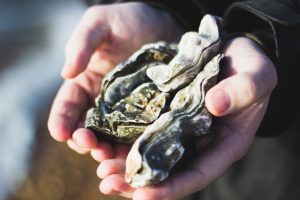MIT Sea Grant funded researchers building sensors to detect pathogens and ensure healthy oyster farming
 MIT Sea Grant funded researchers are building a sensor to detect when bacteria that live on oysters become pathogenic and can cause illness in humans, informing aquaculture operations, production planning, and management.
MIT Sea Grant funded researchers are building a sensor to detect when bacteria that live on oysters become pathogenic and can cause illness in humans, informing aquaculture operations, production planning, and management.
The relevance of this project is based on the fact that oysters are the most significant aquaculture crop produced in Massachusetts. The Vibrios that can make oysters unsafe for human consumption are the same bacteria that also can kill shrimp (the most consumed seafood product in the US).
We are developing sensors that can detect when the bacteria are turning on their genes that create the toxins that make them unsafe to eat. once these sensors are built, we will work with the local aquaculture industry to help better understand the dynamics of the Vibrio bacteria that can lead to oysters being unsafe for human consumption.
Our sensors are still in the process of being built, and as such we have yet to produce field based measurements.



